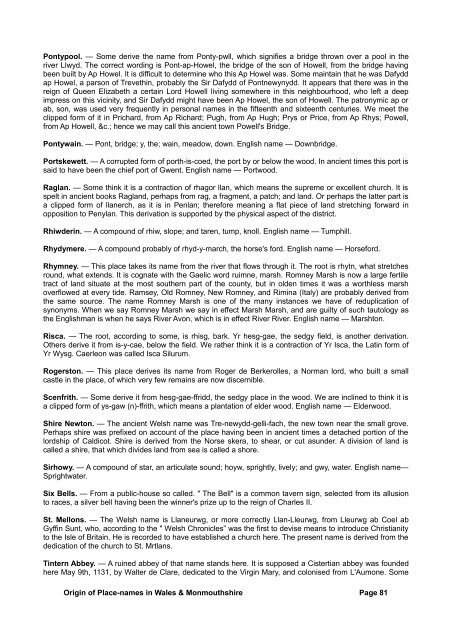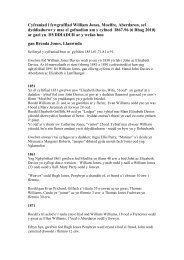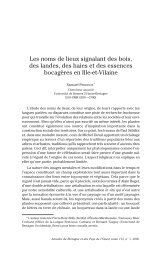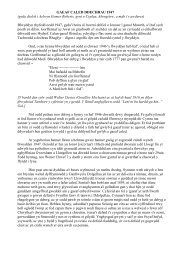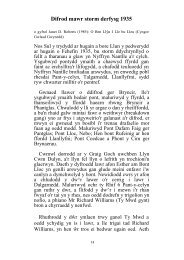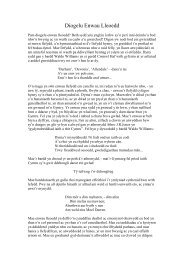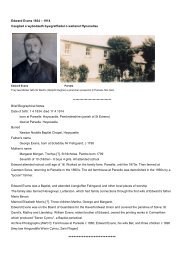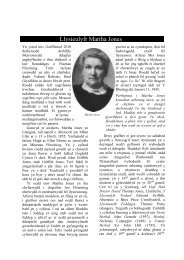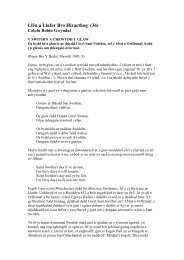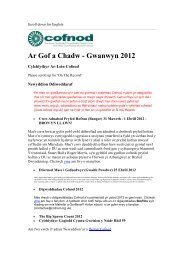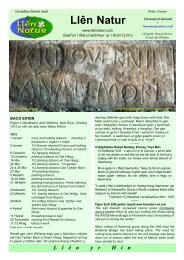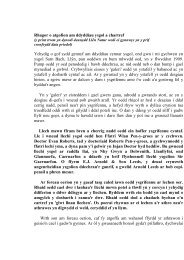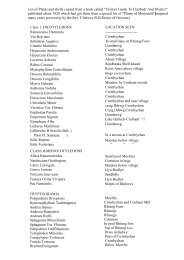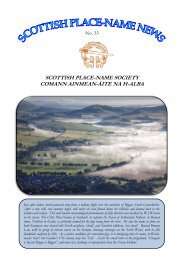Pontypool. — Some derive <strong>the</strong> name from Ponty-pwll, which signifies a bridge thrown over a pool <strong>in</strong> <strong>the</strong>river Llwyd. The correct word<strong>in</strong>g is Pont-ap-Howel, <strong>the</strong> bridge <strong>of</strong> <strong>the</strong> son <strong>of</strong> Howell, from <strong>the</strong> bridge hav<strong>in</strong>gbeen built by Ap Howel. It is difficult to determ<strong>in</strong>e who this Ap Howel was. Some ma<strong>in</strong>ta<strong>in</strong> that he was Dafyddap Howel, a parson <strong>of</strong> Treveth<strong>in</strong>, probably <strong>the</strong> Sir Dafydd <strong>of</strong> Pontnewynydd. It appears that <strong>the</strong>re was <strong>in</strong> <strong>the</strong>reign <strong>of</strong> Queen Elizabeth a certa<strong>in</strong> Lord Howell liv<strong>in</strong>g somewhere <strong>in</strong> this neighbourhood, who left a deepimpress on this vic<strong>in</strong>ity, <strong>and</strong> Sir Dafydd might have been Ap Howel, <strong>the</strong> son <strong>of</strong> Howell. The patronymic ap orab, son, was used very frequently <strong>in</strong> personal <strong>names</strong> <strong>in</strong> <strong>the</strong> fifteenth <strong>and</strong> sixteenth centuries. We meet <strong>the</strong>clipped form <strong>of</strong> it <strong>in</strong> Prichard, from Ap Richard; Pugh, from Ap Hugh; Prys or Price, from Ap Rhys; Powell,from Ap Howell, &c.; hence we may call this ancient town Powell's Bridge.Pontywa<strong>in</strong>. — Pont, bridge; y, <strong>the</strong>; wa<strong>in</strong>, meadow, down. English name — Downbridge.Portskewett. — A corrupted form <strong>of</strong> porth-is-coed, <strong>the</strong> port by or below <strong>the</strong> wood. In ancient times this port issaid to have been <strong>the</strong> chief port <strong>of</strong> Gwent. English name — Portwood.Raglan. — Some th<strong>in</strong>k it is a contraction <strong>of</strong> rhagor llan, which means <strong>the</strong> supreme or excellent church. It isspelt <strong>in</strong> ancient books Ragl<strong>and</strong>, perhaps from rag, a fragment, a patch; <strong>and</strong> l<strong>and</strong>. Or perhaps <strong>the</strong> latter part isa clipped form <strong>of</strong> llanerch, as it is <strong>in</strong> Penlan; <strong>the</strong>refore mean<strong>in</strong>g a flat piece <strong>of</strong> l<strong>and</strong> stretch<strong>in</strong>g forward <strong>in</strong>opposition to Penylan. This derivation is supported by <strong>the</strong> physical aspect <strong>of</strong> <strong>the</strong> district.Rhiwder<strong>in</strong>. — A compound <strong>of</strong> rhiw, slope; <strong>and</strong> taren, tump, knoll. English name — Tumphill.Rhydymere. — A compound probably <strong>of</strong> rhyd-y-march, <strong>the</strong> horse's ford. English name — Horseford.Rhymney. — This <strong>place</strong> takes its name from <strong>the</strong> river that flows through it. The root is rhytn, what stretchesround, what extends. It is cognate with <strong>the</strong> Gaelic word ruimne, marsh. Romney Marsh is now a large fertiletract <strong>of</strong> l<strong>and</strong> situate at <strong>the</strong> most sou<strong>the</strong>rn part <strong>of</strong> <strong>the</strong> county, but <strong>in</strong> olden times it was a worthless marshoverflowed at every tide. Ramsey, Old Romney, New Romney, <strong>and</strong> Rim<strong>in</strong>a (Italy) are probably derived from<strong>the</strong> same source. The name Romney Marsh is one <strong>of</strong> <strong>the</strong> many <strong>in</strong>stances we have <strong>of</strong> reduplication <strong>of</strong>synonyms. When we say Romney Marsh we say <strong>in</strong> effect Marsh Marsh, <strong>and</strong> are guilty <strong>of</strong> such tautology as<strong>the</strong> Englishman is when he says River Avon, which is <strong>in</strong> effect River River. English name — Marshton.Risca. — The root, accord<strong>in</strong>g to some, is rhisg, bark. Yr hesg-gae, <strong>the</strong> sedgy field, is ano<strong>the</strong>r derivation.O<strong>the</strong>rs derive it from is-y-cae, below <strong>the</strong> field. We ra<strong>the</strong>r th<strong>in</strong>k it is a contraction <strong>of</strong> Yr Isca, <strong>the</strong> Lat<strong>in</strong> form <strong>of</strong>Yr Wysg. Caerleon was called Isca Silurum.Rogerston. — This <strong>place</strong> derives its name from Roger de Berkerolles, a Norman lord, who built a smallcastle <strong>in</strong> <strong>the</strong> <strong>place</strong>, <strong>of</strong> which very few rema<strong>in</strong>s are now discernible.Scenfrith. — Some derive it from hesg-gae-ffridd, <strong>the</strong> sedgy <strong>place</strong> <strong>in</strong> <strong>the</strong> wood. We are <strong>in</strong>cl<strong>in</strong>ed to th<strong>in</strong>k it isa clipped form <strong>of</strong> ys-gaw (n)-ffrith, which means a plantation <strong>of</strong> elder wood. English name — Elderwood.Shire Newton. — The ancient Welsh name was Tre-newydd-gelli-fach, <strong>the</strong> new town near <strong>the</strong> small grove.Perhaps shire was prefixed on account <strong>of</strong> <strong>the</strong> <strong>place</strong> hav<strong>in</strong>g been <strong>in</strong> ancient times a detached portion <strong>of</strong> <strong>the</strong>lordship <strong>of</strong> Caldicot. Shire is derived from <strong>the</strong> Norse skera, to shear, or cut asunder. A division <strong>of</strong> l<strong>and</strong> iscalled a shire, that which divides l<strong>and</strong> from sea is called a shore.Sirhowy. — A compound <strong>of</strong> star, an articulate sound; hoyw, sprightly, lively; <strong>and</strong> gwy, water. English name—Sprightwater.Six Bells. — From a public-house so called. " The Bell" is a common tavern sign, selected from its allusionto races, a silver bell hav<strong>in</strong>g been <strong>the</strong> w<strong>in</strong>ner's prize up to <strong>the</strong> reign <strong>of</strong> Charles II.St. Mellons. — The Welsh name is Llaneurwg, or more correctly Llan-Lleurwg, from Lleurwg ab Coel abGyff<strong>in</strong> Sunt, who, accord<strong>in</strong>g to <strong>the</strong> " Welsh Chronicles” was <strong>the</strong> first to devise means to <strong>in</strong>troduce Christianityto <strong>the</strong> Isle <strong>of</strong> Brita<strong>in</strong>. He is recorded to have established a church here. The present name is derived from <strong>the</strong>dedication <strong>of</strong> <strong>the</strong> church to St. Mrtlans.T<strong>in</strong>tern Abbey. — A ru<strong>in</strong>ed abbey <strong>of</strong> that name st<strong>and</strong>s here. It is supposed a Cistertian abbey was foundedhere May 9th, 1131, by Walter de Clare, dedicated to <strong>the</strong> Virg<strong>in</strong> Mary, <strong>and</strong> colonised from L'Aumone. SomeOrig<strong>in</strong> <strong>of</strong> Place-<strong>names</strong> <strong>in</strong> Wales & Monmouthshire Page 81
derive T<strong>in</strong>tern from d<strong>in</strong>, fortified hill, a camp; <strong>and</strong> Teyron, or Tegernacus, <strong>the</strong> gr<strong>and</strong>son <strong>of</strong> Gwladys. We ra<strong>the</strong>rth<strong>in</strong>k <strong>the</strong> correct word<strong>in</strong>g is D<strong>in</strong>-Teytn. The prefix is quite clear, as <strong>the</strong> ru<strong>in</strong>ed abbey occupies a gentleem<strong>in</strong>ence <strong>in</strong> <strong>the</strong> middle <strong>of</strong> a circular valley. The suffix teytn means a k<strong>in</strong>g, a supreme ruler, <strong>in</strong> allusion hereprobably to <strong>the</strong> royal founder <strong>of</strong> <strong>the</strong> abbey, who was a scion <strong>of</strong> Gilbert, Earl <strong>of</strong> Brionne. T<strong>in</strong>tern Parva, or LittleT<strong>in</strong>tern, takes its name from this celebrated abbey. English name— Rexhill Abbey.Tredegar. — Troedygaer, say some, is <strong>the</strong> right word<strong>in</strong>g, which signifies a <strong>place</strong> at <strong>the</strong> foot <strong>of</strong> <strong>the</strong> fort. O<strong>the</strong>rsth<strong>in</strong>k it is Tre-deg-aradr, <strong>the</strong> town <strong>of</strong> ten ploughs, or Tre-deg-erw, <strong>the</strong> town <strong>of</strong> ten acres. A very plausiblederivation is <strong>the</strong> follow<strong>in</strong>g: tre, abode; deg- teg, fair; <strong>and</strong> dry l<strong>and</strong>; signify<strong>in</strong>g an abode situated on a fair l<strong>and</strong>,or a f<strong>in</strong>e abode situated on arable l<strong>and</strong>. Mr. Octavius Morgan <strong>in</strong> <strong>the</strong> " Archaeological Cambrensis " <strong>of</strong>fers <strong>the</strong>follow<strong>in</strong>g derivation: — The earliest mention <strong>of</strong> this name is <strong>in</strong> an old copy <strong>of</strong> a poem by a Welsh poet wh<strong>of</strong>lourished between 1430 <strong>and</strong> 1470, <strong>and</strong> presided at a gorsedd <strong>in</strong> Glamorgan <strong>in</strong> 1460, about which time hewrote a poem <strong>in</strong> praise <strong>of</strong> Sir John Morgan, whom <strong>in</strong> <strong>the</strong> title he styles " Syr Sion ap forgan o Dre-Degyr (t<strong>and</strong> d be<strong>in</strong>g <strong>in</strong>terchangeable consonants <strong>in</strong> <strong>the</strong> Welsh language). The Tre <strong>and</strong> Degyr <strong>in</strong> both <strong>in</strong>stances areseparated by a hyphen, <strong>and</strong> Degyr <strong>in</strong> both <strong>in</strong>stances has a capital D, <strong>in</strong>dicat<strong>in</strong>g a proper name. In a MS. <strong>of</strong><strong>the</strong> seventeenth century, <strong>in</strong> <strong>the</strong> possession <strong>of</strong> <strong>the</strong> late Mr. S. R. Bosanquet, is this statement, "The house <strong>of</strong>Trefddigr, holden by <strong>in</strong>heritance <strong>of</strong> blood from time to time, is <strong>the</strong> most ancient <strong>in</strong> Wales ;" " Teigr ap Tegonwywas an ancient pr<strong>in</strong>ce <strong>in</strong> K<strong>in</strong>g Arthur's time." The t is changed <strong>in</strong>to d for <strong>the</strong> sake <strong>of</strong> euphony. The <strong>place</strong>,aga<strong>in</strong>, is called Tref-Deigr, <strong>and</strong> though Teigr may be as mythical as K<strong>in</strong>g Arthur, this is strong presumptiveevidence that <strong>the</strong>re was such a traditionary personage connected with this <strong>place</strong>, at whatever time he mayhave lived. Aga<strong>in</strong>, <strong>in</strong> a pedigree by Robert Vaughan, <strong>of</strong> Hengwrt, made about 1660, <strong>and</strong> now among <strong>the</strong>Hengwrt MSS. at Peniarth, <strong>the</strong> name is written " Thomas Morgan de Dref-deg-yr, Esq." From this evidence itseems to me clear that Tredegar received its name from its early possessor, whose name was Teigr, thoughwhen he lived <strong>and</strong> who he was is not known, but his name was attached to his tref or homestead, <strong>and</strong> hascont<strong>in</strong>ued to this day, as is <strong>the</strong> case with an adjo<strong>in</strong><strong>in</strong>g hamlet <strong>in</strong> <strong>the</strong> same parish, which now reta<strong>in</strong>s its name<strong>of</strong> Tre-Gwilym, derived from be<strong>in</strong>g <strong>the</strong> tref, residence or homestead, <strong>of</strong> William de Berkerolles, a Normanwho came over at <strong>the</strong> Conquest, <strong>and</strong> was fa<strong>the</strong>r to Roger de Berkerolles, who built a small castle adjo<strong>in</strong><strong>in</strong>g it,which after <strong>the</strong> Norman usage he called Rogerstone, <strong>and</strong> both <strong>names</strong> are reta<strong>in</strong>ed at <strong>the</strong> present day ; <strong>the</strong>one be<strong>in</strong>g <strong>the</strong> Welsh name <strong>of</strong> <strong>the</strong> tref <strong>and</strong> hamlet, <strong>and</strong> <strong>the</strong> o<strong>the</strong>r <strong>the</strong> name <strong>of</strong> <strong>the</strong> manor founded by Roger,<strong>the</strong> builder <strong>of</strong> <strong>the</strong> small castle, a scanty fragment <strong>of</strong> <strong>the</strong> wall <strong>of</strong> which still exists." We have a few <strong>in</strong>stances <strong>in</strong>which tref has been changed to troed. Troedyraur was anciently called Tredeyrn, <strong>the</strong> k<strong>in</strong>g's abode; but wecannot f<strong>in</strong>d a s<strong>in</strong>gle <strong>in</strong>stance <strong>of</strong> troed be<strong>in</strong>g changed to tref Troed-rhiwgwair is <strong>in</strong> <strong>the</strong> immediateneighbourhood <strong>of</strong> Tredegar, but we can f<strong>in</strong>d no etymological reason to th<strong>in</strong>k <strong>the</strong> one is allied with <strong>the</strong> o<strong>the</strong>r.The render<strong>in</strong>g <strong>of</strong> <strong>the</strong> name <strong>in</strong>to Tre-deg-erw f <strong>the</strong> town <strong>of</strong> ten acres, is too wide <strong>of</strong> <strong>the</strong> mark, because <strong>the</strong>territory is immensely more than ten acres. Tri-deg-erw, sixty acres, would be more feasible from <strong>the</strong>numerical po<strong>in</strong>t <strong>of</strong> view, but this mode <strong>of</strong> count<strong>in</strong>g is far too modern to be applied to this ancient <strong>place</strong>-name.We were once <strong>in</strong>cl<strong>in</strong>ed to derive it thus: tre, abode; deg, fair; gwar, <strong>the</strong> nape <strong>of</strong> <strong>the</strong> neck, a ridge; signify<strong>in</strong>g afair abode on an elevated <strong>place</strong>; but s<strong>in</strong>ce we saw Mr. Octavius Morgan's exposition <strong>of</strong> <strong>the</strong> name we adopthis <strong>in</strong> preference to all o<strong>the</strong>rs. Many Welsh personal <strong>names</strong> conta<strong>in</strong> <strong>the</strong> word teyrn, a k<strong>in</strong>g, a monarch, <strong>the</strong>Irish form <strong>of</strong> which is tigern, tighearna; <strong>and</strong> <strong>in</strong> our early <strong>in</strong>scriptions we have tigirn-i <strong>and</strong> tegern-o. Tegyrn was<strong>the</strong> Brythonic for Teyrn. From Cornwall we have Tegtrnomaliy which means k<strong>in</strong>g-like or lord-like, hence weare <strong>in</strong>duced to th<strong>in</strong>k .that Tegyr is an ancient form <strong>of</strong> Teyrn. English name — K<strong>in</strong>gton.Trefeth<strong>in</strong>. — Some derive it from Tref-y-d<strong>in</strong>, camp town; but we ra<strong>the</strong>r th<strong>in</strong>k it is a compound <strong>of</strong> tref, abode,<strong>and</strong> eith<strong>in</strong>, furze, gorse; signify<strong>in</strong>g an abode situated on furzy l<strong>and</strong>. English name — Gorseton.Trelleck. — A corruption <strong>of</strong> Trelech a <strong>place</strong> <strong>of</strong> stones; so called from three stone pillars which st<strong>and</strong> <strong>in</strong> asmall field <strong>in</strong> <strong>the</strong> <strong>place</strong>. Tradition says that <strong>the</strong>y were erected by Harold <strong>in</strong> commemoration <strong>of</strong> a victory over<strong>the</strong> Britons. It is more probable that <strong>the</strong>y are relics <strong>of</strong> Druidism, <strong>and</strong> <strong>the</strong> spot whereon <strong>the</strong>y st<strong>and</strong> was<strong>in</strong>cluded with<strong>in</strong> <strong>the</strong> prec<strong>in</strong>cts <strong>of</strong> a consecrated grove. English name — Stoneham.Twyngwyn. — A compound <strong>of</strong> twyn, a hillock, <strong>and</strong> gwyn, white. Ar dwyn, on an em<strong>in</strong>ence. The name is quitedescriptive <strong>of</strong> <strong>the</strong> position <strong>of</strong> this <strong>place</strong>. English name — Whitehill.Tydee. — A corruption <strong>of</strong> Ty-du, which means black house, probably from an ancient homestead <strong>of</strong> <strong>the</strong>name. English name — Blackham.Usk. — The Welsh name is Bryn-biga; bryn, a hill, <strong>and</strong> pig-byga a po<strong>in</strong>t. The English peak specifically means<strong>the</strong> sharp top <strong>of</strong> a hill or mounta<strong>in</strong>, which is quite descriptive <strong>of</strong> <strong>the</strong> hill <strong>in</strong> <strong>the</strong> <strong>place</strong>, which term<strong>in</strong>ates <strong>in</strong> apo<strong>in</strong>t or peak. The present name, Usk, is an Anglicized form <strong>of</strong> Wysg, water, <strong>the</strong> name <strong>of</strong> <strong>the</strong> river uponwhich <strong>the</strong> town is situated. It assumes various forms — Exe, Ax, Ux, <strong>and</strong> Ox, &c. The Exe has given its nameOrig<strong>in</strong> <strong>of</strong> Place-<strong>names</strong> <strong>in</strong> Wales & Monmouthshire Page 82
- Page 1 and 2:
HANDBOOK OF THE ORIGIN OF PLACE-NAM
- Page 3 and 4:
§ § § § §The Author begs to st
- Page 5 and 6:
pitiful cries of the railway offici
- Page 7 and 8:
Bishop Percy says that "in England,
- Page 9 and 10:
The city of Chester is still popula
- Page 11 and 12:
There's Cumwhitton, Cumwhinton, Cum
- Page 13 and 14:
Llwyn in its primary' sense means a
- Page 15 and 16:
PLACE-NAMES IN WALES.Wales. — The
- Page 17 and 18:
Church are generally dedicated to e
- Page 19 and 20:
think he was a contemporary of St.
- Page 21 and 22:
Rhosbeirio. — Rhos, a moor, a dry
- Page 23 and 24:
of Brecknock," states that this vic
- Page 25 and 26:
Cam cnwir ef Cwmdu,Cwm gwyn yw & n
- Page 27 and 28:
Penderyn. — A corruption probably
- Page 29 and 30:
Ardudwy. — Ar, upon or above; tud
- Page 31 and 32:
to mark its pre-eminence over the o
- Page 33 and 34: Some think that eirw is a corruptio
- Page 35 and 36: present form — Caerfyrddin.Abergw
- Page 37 and 38: place of refuge; hence the name. En
- Page 39 and 40: Llansawyl. — The church was dedic
- Page 41 and 42: eject. The village took its name fr
- Page 43 and 44: house, and attempted to kill an inf
- Page 45 and 46: Gwydir. — Prima facie one may tak
- Page 47 and 48: Nefyn. — The church was probably
- Page 49 and 50: DENBIGHSHIRE.Anglicized form of Din
- Page 51 and 52: Llangollen. — From Collen, a sain
- Page 53 and 54: hands into their pockets to pay a c
- Page 55 and 56: Cefn. — The name signifies a ridg
- Page 57 and 58: Maesgarmon. — Named in honour of
- Page 59 and 60: Abertridwr. — Tridwr, three water
- Page 61 and 62: it is said, was originally built by
- Page 63 and 64: Cwmllynfell. — Cwm, a narrow vale
- Page 65 and 66: Gwarycaeau. — Gwdr, the nape of t
- Page 67 and 68: means a cultivated region, a vale,
- Page 69 and 70: Penrhiwfer.- Pen, head, top; rhiw,
- Page 71 and 72: Port Talbot. — So called in 1835
- Page 73 and 74: Trealaw. — This appellation was g
- Page 75 and 76: Aberdyfi. — So called from its si
- Page 77 and 78: Llanddwywe. — From Dwywau, a desc
- Page 79 and 80: Crickhowell and some in the directi
- Page 81 and 82: Griffithstown. — This village was
- Page 83: and gwy, water. Treiddiod troth tna
- Page 87 and 88: Caersws. — It appears that the Ro
- Page 89 and 90: English name — Ervylton.Llanymech
- Page 91 and 92: Angle. — Probably from the angle-
- Page 93 and 94: Gellyswick. — Another hybrid. Gel
- Page 95 and 96: that the two rivers in their flowin
- Page 97 and 98: ecame the bishop of the see, and wa
- Page 99 and 100: earth formerly stood on a summit on
- Page 101 and 102: Pilleth. — A corruption of pwll,
- Page 103 and 104: Howells, Rev. J., Mountain AshHowel
- Page 105 and 106: Williams, D., PenywernWilliams, Rev


